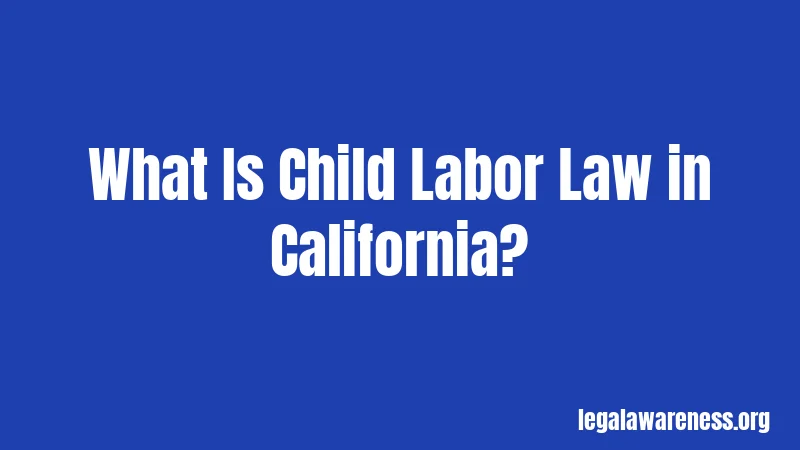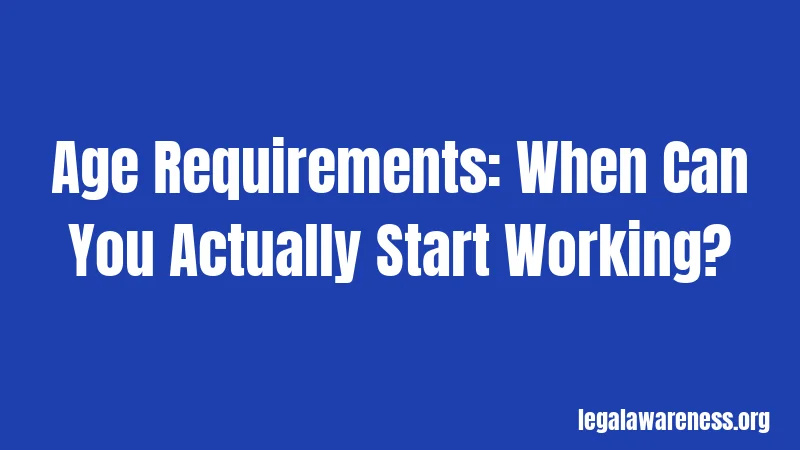California Labor Laws for Minors (2026): Your Complete Guide to Working Rights
Most teenagers have no idea how strictly California regulates their work. Seriously. If you’re a teen thinking about getting a job, or you’re a parent wondering what the rules are, this matters. California has some of the toughest child labor laws in the country. The good news? They’re designed to protect you. The not-so-good news? There are a lot of rules to know.
You’re not alone if this feels confusing. These laws exist for a reason, and once you understand them, everything gets way clearer. Let’s break down exactly what you need to know about working in California as a minor.
What Is Child Labor Law in California?

Think of it like rules of the road, but for jobs. California child labor laws set limits on when you can work, how many hours you can work, and what types of jobs are allowed. A minor is anyone under 18 who is required to attend school.
Here’s the basic idea: The law wants to make sure school comes first. Honestly, this is probably the most important rule to understand. Your education matters, and California’s laws are built to protect that. These laws also protect you from unsafe work and unfair treatment.
The Work Permit: You’ll Need One
Here’s where things get official. Almost every minor working in California needs a work permit. Yep, that’s a real requirement. It’s not just a suggestion.
How does it work? Stay with me here. You need to fill out something called a “Statement of Intent to Employ Minor and Request for Work Permit.” That’s the official name, but think of it as your permission slip for work. Both you and your future employer fill it out together. Your parent or guardian has to sign it too.
Then what? You take it to your school. Specifically, you can give it to your school’s office during the school year. During summer when school is closed, you take it to your school district’s superintendent. They’ll review it and issue your Permit to Employ and Work if everything checks out.
Pretty straightforward, right? Your school wants to make sure the job won’t mess with your education or put you in danger.
Not sure what jobs need permits? Good question. Most jobs require one, but there are exceptions. Odd jobs at private homes (like helping a neighbor), agricultural work on your parents’ farm, and some sales jobs don’t need permits.
Age Requirements: When Can You Actually Start Working?

Okay, this is important. The minimum working age in California is 14. If you’re 13 or younger, you generally can’t work. Period.
But wait—there are exceptions. Kids as young as five can work in entertainment (like being a child actor), but that requires special permits from the Labor Commissioner. Young kids can also do odd jobs, work in agriculture if their parents own the place, or sell newspapers. These don’t need work permits.
If you’re 14 or 15, you can work, but you have the most restrictions. You can’t work during school hours on school days unless you’re in a special work-study program. Pretty specific rules apply to you.
If you’re 16 or 17, you have more freedom. You can work during school and have fewer hour restrictions. But you still can’t work in dangerous jobs.
Hour Limits: Here’s How Many Hours You Can Work
Wondering if your job schedule is legal? Let me break it down by age. This changes depending on whether school is in session.
For 14- and 15-year-olds during school: You can work up to 3 hours on school days. On non-school days, you can work up to 8 hours. Your total for the week can’t exceed 18 hours. So basically, work has to fit around school, not the other way around.
During school breaks and summer? That’s different. You can work up to 8 hours per day and 40 hours per week. Much more flexibility when you’re not juggling classes.
For 16- and 17-year-olds during school: You get more time. You can work up to 4 hours on school days and 8 hours on non-school days. Weekly limit is 48 hours during the school week. When school’s not in session, you can work up to 8 hours per day and 48 hours per week.
Important timing detail: You can only work between 7 a.m. and 7 p.m. on regular school days. But from June 1 through Labor Day, you can work until 9 p.m. This is so you get enough sleep during the school year.
Sound complicated? It’s actually not once you write down your schedule. Most employers know these rules and won’t schedule you illegally.
Hazardous Jobs You Can’t Do

Hold on, this part matters. Some jobs are off-limits for minors, period. California and the federal government have a list of dangerous work that you cannot do.
For everyone under 18, you can’t work with hazardous materials, operate certain machines, work in mining, or do anything that could seriously hurt you. That includes working with chemicals, heavy equipment, and anything that involves heights or dangerous machinery.
For 14- and 15-year-olds specifically, the restrictions are even tighter. You can’t work in manufacturing, in kitchens where you’d use ovens or grills, at gas stations, or doing anything that involves entertainment performances (like singing or dancing for payment). You also can’t do door-to-door sales.
These aren’t just suggestions. Violating these rules can result in civil penalties ranging from $500 to $10,000 per minor employed per violation, and criminal violations can lead to up to 6 months of imprisonment and/or fines up to $10,000.
Pay and Minimum Wage
Let’s talk money. You have the right to fair pay, just like adult workers.
Effective January 1, 2026, California’s minimum wage is $16.90 per hour for all employers. That’s what you should be making, minimum, for every hour you work. No exceptions based on your age (with very limited exceptions for learners).
There’s one small exception for learners. If you have zero experience in a job type, you can be paid 85 percent of minimum wage (about $14.37 per hour) for your first 160 hours of work. After that, you jump to full minimum wage.
Confused about whether you’re a learner? You only count as a learner if you’ve never done similar work before. If you’ve worked retail before and get a new retail job, you’re not a learner. Pretty straightforward.
School Requirements: You Still Have to Go
Here’s the deal. You have to keep attending school, no matter what. Working doesn’t get you out of that.
If you’re 16 or 17, you need to attend at least 4 hours per week of school if you’re working regularly, or 15 hours per week if you’re not working much. For anyone younger than 16, it’s full-time school. No negotiating this one.
If your job interferes with your ability to go to school, your work permit can be canceled. Your school takes this seriously, and so should you.
What About Entertainment Work?
Entertainment is different. Really different. If you’re thinking about working as an actor, model, dancer, or musician, special rules apply.
The Labor Commissioner (not your school) issues the permits for entertainment work. The rules are stricter, but they exist because entertainment can be unpredictable and demanding. You need the Labor Commissioner’s approval in writing before you can do any entertainment work.
Recent Changes in 2025: What’s New
Under changes that took effect on January 1, 2025, sixteen- and seventeen-year-olds can now work the same hours and days as an adult, and parental permission is no longer required for them to work longer or later hours. This was a big update.
There’s also a new law that started January 1, 2025. Assembly Bill 3234 requires employers to disclose child labor findings from voluntary audits by publishing audit results on their website, including the timing of the audit, any child labor findings, and copies of child labor policies. This makes it easier for families to see if companies are breaking child labor laws.
Penalties and Consequences: What Happens If Rules Get Broken
Okay, this is the serious part. Here’s what happens when employers violate these laws.
If you’re working illegally—meaning you’re working too many hours, without a permit, or at a hazardous job—your employer faces big consequences. Civil penalties range from $500 to $10,000 per minor employed per violation. Criminal violations are misdemeanors and are punishable by imprisonment for up to 6 months and/or fines up to $10,000.
But here’s the thing. If you’re the one being treated unfairly, there’s help available. The Labor Commissioner investigates complaints. You’re not alone in this.
What to Do If Something Feels Wrong
I looked this up recently. So many teens don’t know what to do if their employer is breaking the rules. Let me be clear: You have options.
If you’re being asked to work too many hours, without a permit, or in dangerous conditions, speak up. First, try talking to your manager or employer. Sometimes it’s just a misunderstanding.
If that doesn’t work, contact your school’s work experience coordinator. They can help. You can also reach out to the California Labor Commissioner’s Office directly. They have a Division of Labor Standards Enforcement (DLSE) that specifically handles child labor complaints.
Here’s what they’ll help with: work without a permit, working too many hours, dangerous jobs, not getting paid properly, not getting meal breaks, and any other violation of child labor laws.
Need to file a complaint? Visit the California Department of Industrial Relations website or call your local Labor Commissioner’s Office. Most people don’t realize this is free.
Breaks and Other Rights
You deserve breaks. California law requires all workers to get meal and rest breaks. This applies to minors too.
If you work more than 5 hours in a day, you get a 30-minute meal break (unpaid). If you work more than 10 hours, you get two meal breaks. You also get 10-minute rest breaks every 4 hours of work (paid).
Your employer must follow these rules. Period. It’s not optional, and it’s not negotiable.
Special Cases: Emancipated Minors and Work-Study Programs
Emancipated minors have some different rules. If you’re legally emancipated, you can get a work permit without your parent’s permission. But you still have to follow all the other child labor laws. Being emancipated doesn’t mean you can work unlimited hours or dangerous jobs.
Work-study programs and apprenticeships are special too. If you’re in an approved work-study program through your school, some rules change. You might be able to work during school hours and work more total hours per week. But your school has to approve it first.
Understanding School Attendance During Work
Here’s where it gets real. You need to actually go to school. Working doesn’t change that.
If you’re 14 or 15, you need full-time school attendance. If you’re 16 or 17, you need at least 4 hours per week of school if you’re working, or 15 hours per week if you’re not working much.
Missing school to work? That’s not allowed. Your employer has no right to schedule you during school hours on school days (except in work-study programs). And your school can cancel your work permit if you’re not maintaining school attendance.
Frequently Asked Questions
Do I need a work permit if I’m working for my parents? Not always. If you work for your parents and they own or operate the business, you might not need a permit. But you still have to follow all other child labor laws about hours and hazardous jobs. Check with your school to be sure.
Can I work online or do remote jobs? Mostly yes. Online jobs typically follow the same rules as in-person jobs. You still need a work permit if you’re under 18 and in school. The hour restrictions still apply too.
What if I’m a high school graduate but still under 18? Great news! You’re considered an adult worker. You don’t need a work permit anymore, and normal hour restrictions don’t apply. You can work whatever hours your employer schedules.
Can my employer pay me in cash instead of a check? Yes, employers can pay in cash. But you still have to be paid at least minimum wage for every hour worked. Get written records of your hours and pay. Don’t let anyone tell you cash is “off the books.”
What’s the difference between lunch breaks and rest breaks? Lunch breaks (meal periods) are unpaid and are usually 30 minutes. Rest breaks are 10 minutes and are paid. You’re entitled to both if you work long enough. These are your rights, not privileges.
Final Thoughts
Now you know the basics of California’s child labor laws. These rules exist because teenagers deserve protection. Your education matters. Your safety matters. And you deserve fair pay for your work.
Stay informed, and don’t hesitate to speak up if something feels wrong. The Labor Commissioner’s Office is there for you. When in doubt, ask your school counselor or look it up. You’ve got this.
References
California Department of Industrial Relations – Child Labor Laws
California Labor Commissioner – Child Labor Booklet
California Minimum Wage Information
California Child Labor Laws Summary Charts
Employment Law Handbook – California Child Labor Laws 2025
